The 3 o’clock, Good Friday service at the city church of the Immaculate Conception comprises a poignant Crucifixion tableau.
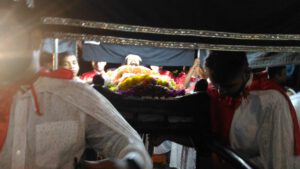
Soon thereafter, a procession of Senhor Morto (Dead Lord) on an andor (black canopied wooden platform carrying a life-size statue of Our Lord who died on the Cross) starts off, with a statue of Our Lady in trail. It wends its way through the main thoroughfares (the church square, a section of 18th June, Pissurlencar, past Azad Maidan), making a major halt to pray at the chapel formerly attached to the mansion of a Portuguese noble family. The cavalcade then proceeds via M. G. Road and Dr D. R. de Sousa, past the Garcia de Orta Garden, and up the church stairway.
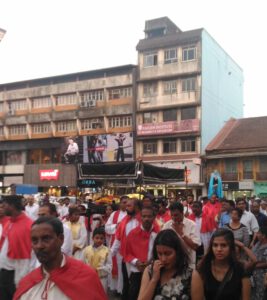
The pious march takes approximately 90 minutes. It is animated by five decades of the Marian rosary recited over speakers fitted at several points; and by Lenten hymns sung by a choir to the accompaniment of a brass band. The circuit is marked by over ten descansos (halts). At these points, penitents, all of them de rigueur, in funereal attire, flock to the two statues. Members of other religious faiths also pay their respects; many watch in awe or stand at attention (I noticed a policeman saluting).
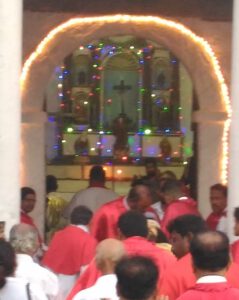
One such halt is at a quaint chapel traditionally called ‘Capela de Dom Lourenço’, located behind what is now the iconic Hotel Mandovi. In times past, the chapel was part of the manor belonging to Dom Lourenço de Noronha, a Portuguese nobleman, who had acquired a large estate in the then incipient city centre. After the palatial mansion was razed, the chapel was handed over to the care and possession of the city church. Alas, the venerable structure is in a state of disrepair.
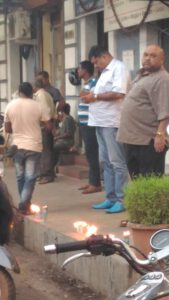
On the said route, two Hindu families (Caculó and Neurencar) traditionally offer garlands. Businesses brighten up their establishments, or simply light candles and burn incense on the adjoining pavements.
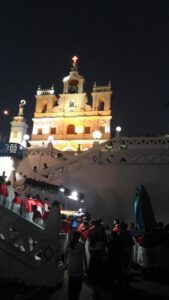
In a coda to the baroque event is a sermon (Sermão da Soledade de Maria) at a stair landing: here, from a balcony that serves as a makeshift pulpit, a priest extols the virtues of Mary and highlights her present solitude. The congregation listens in silence even while vehicle noises spoil the ambience.
The statues return to the church for final veneration. By 8 o’clock, they call it a night!